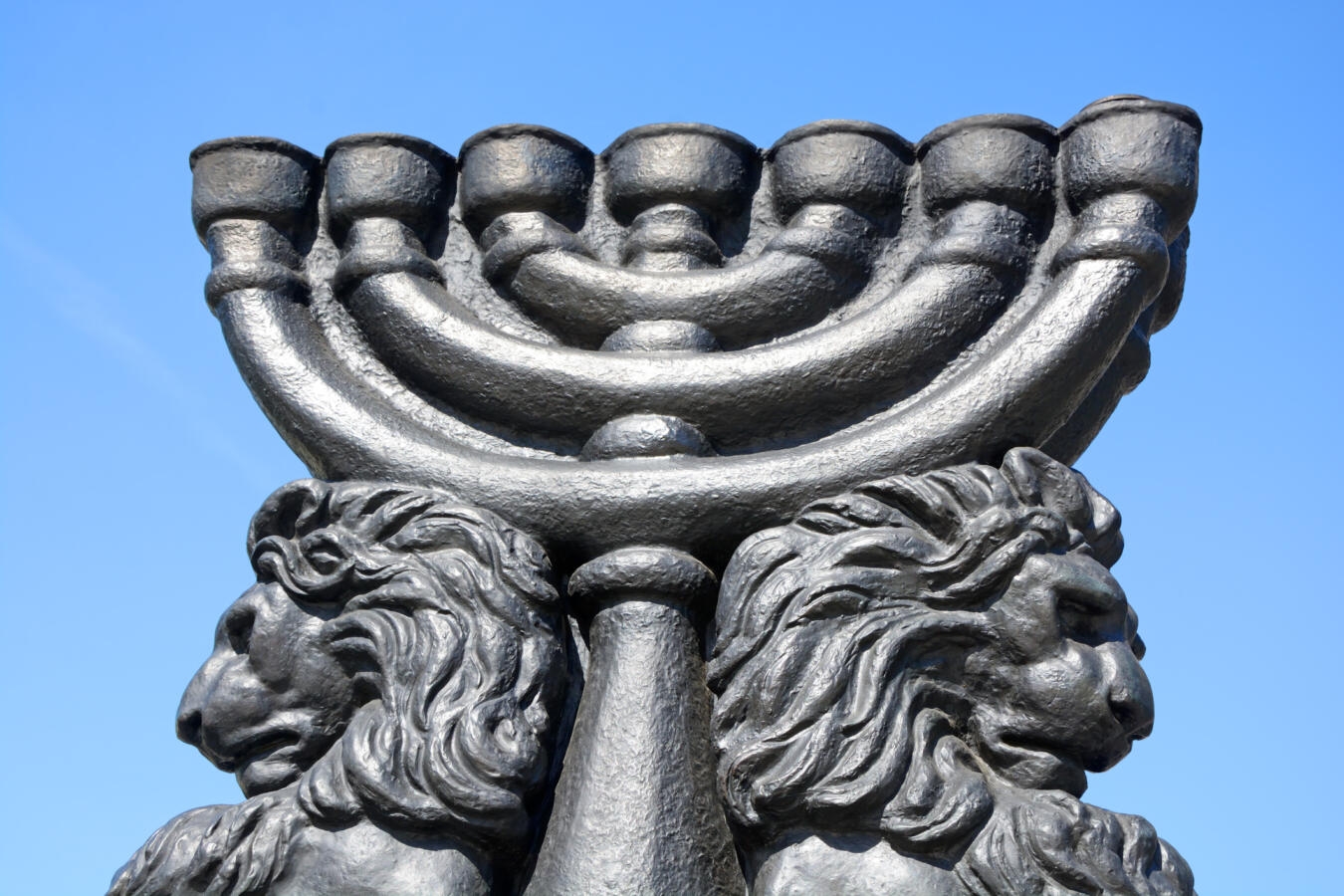The Bible offers many details about how Jewish holidays are to be celebrated and, in some cases, explanations for how they came about (the Exodus giving us Passover, the victory of Mordechai and Esther giving us Purim). But there’s one holiday missing entirely from the Hebrew scriptures: The story of Hanukkah is found nowhere in Tanakh.
The exploits of the Maccabees, who improbably defeated the powerful Syrian Greek tyrant Antiochus and reclaimed the Jerusalem Temple — and along with it, religious and political autonomy — are recounted in the Books of the Maccabees. But this story was not preserved in the Jewish canon. Ironically, it comes down to us in the Christian canon, and in Greek rather than Hebrew. Celebrating the victory of the Maccabees seems to have been far from a universal Jewish practice in antiquity. The Talmud contains long discussions of holidays (Passover gets over 200 pages), but only a few brief discussions about Hanukkah (mostly buried within the material on Shabbat) generated by one rabbi’s offhand comment that he can’t quite remember what the holiday is all about.
The reasons for this are not difficult to surmise. First Maccabees especially describes a brand of zealotry that may have won the war, but at enormous cost to the integrity of the heroes. Early in the story, the Syrian Greeks demand that Jews offer pagan sacrifices on the Temple altar. Mattathias, the patriarch of the Maccabees, not only refuses, but promptly slaughters a Jew who steps forward to comply, then dumps his corpse on the altar. It’s an arresting image, particularly because, as close readers of the Bible know, God abhors human sacrifice. For good measure, Mattathias next kills the king’s official and tears down the altar so that no other Jews can follow suit. At this point, he flees for his life, an unrepentant fugitive murderer. Mattathias’ escape unmistakably echoes the story of Moses who killed an Egyptian taskmaster beating an Israelite slave and then fled Egypt, only to come back and liberate the Jews. But unlike Moses, Mattathias didn’t start by killing the enemy — he struck down one of his own
Now in hiding, Mattathias and other Jewish rebels are forced to fight off frequent incursions from Antiochus’ men. To avoid abject slaughter, they start fighting on the Sabbath, violating the very laws that, ironically, Mattathias just killed a coreligionist to protect. The Maccabees next start violently tearing down idolatrous altars and forcibly circumcising Jewish children whose parents had refrained from doing so for fear of Greek retaliation — essentially terrorizing the people they are trying to liberate. And that’s just the first two chapters.

Help us keep Jewish knowledge accessible to millions of people around the world.
Your donation to My Jewish Learning fuels endless journeys of Jewish discovery. With your help, My Jewish Learning can continue to provide nonstop opportunities for learning, connection and growth.
It’s not difficult to imagine why the Hanukkah story was not universally embraced. The Jew-on-Jew violence is hardly a model to emulate, particularly since the Talmud states unequivocally that the destruction of Jerusalem in a later generation was the result of intra-Jewish violence and zealotry. But the dark period of Antiochus’ oppression did sneak its way into the Hebrew Bible, albeit in code.
Toward the end of the Tanakh is the Book of Daniel, a collection of court tales about a Babylonian Jew who rises to become an advisor to the king. Overall, it’s a book about the anxieties of living under foreign rule, and arguably a manual for navigating life as a minority in a world that is at best indifferent and at worst hostile. But it’s also an apocalyptic work, seeing history as a succession of evil empires rising and falling until a cataclysm results in the establishment of a new world order, an idea repeated throughout the book, always in the form of strange images — like giant statue made of many materials (chapter 2) or a series of beasts that rise from the sea (chapter 7) — that require interpretation.
Much of the book is intentionally oblique about the identity of these evil empires and emperors. But a consensus has emerged, among commentators both ancient and modern, that the last empire described therein is none other than the Syrian Greek regime of Antiochus IV Epiphanes, the same tyrant said to have been defeated by the Maccabees.
In the seventh chapter, we encounter a dream in which four beasts emerge from the sea, each of them ruling for a time and then fading away. The last of these is different from the others, with ten horns and “a mouth that spoke arrogantly.” The next figure to appear is one “like a man” who is appointed king not only over Israel, but over the entire world, and is given an everlasting dominion. It’s a messianic vision of a completely new and better world order. Scholars believe that this arrogant beast is Antiochus, who is never named, presumably because this was composed during his reign and would have brought violence down on anyone in possession of such a treasonous text. The one “like a man” is the messiah.
Mattathias, Judah Maccabee, and the other heroes of the Hanukkah story are not here. That’s because a story of Jewish zealots seizing the throne from an evil king is antithetical to the thrust of Daniel, which repeatedly counsels that the key to dealing with foreign kings is to serve them with fidelity and grace wherever possible. Barring that, as in the case of Antiochus, it is best to stand back and let God mete out justice. Israel’s only obligation, according to Daniel, is to uphold its part of the divine covenant. As long as it does that, its worsening condition only attests that redemption is close at hand.
The advice Daniel offers for diaspora Jews, and its view of the world, are both in the minority in Jewish tradition. That’s one reason the book isn’t read in full in synagogue and doesn’t usually receive a great deal of attention. Jews tend to prefer Esther, which is read every year on Purim, as a model for diaspora survival: Be true to yourself and your people, seek influence and use it to help your own. But the view presented in Daniel — stand back in the face of persecution and leave it to God — has not been excised. Though it is never publicly read by Jews today, its approach to dealing with tyranny remains a part of the canon, albeit in coded form. And it stands as an interesting counterbalance to the zealous approach taken in 1 Maccabees, which concerns the same enemy: Fight for the covenant, no matter the cost, even if that cost is the blood of your own people.
Explore Hanukkah’s history, global traditions, food and more with My Jewish Learning’s “All About Hanukkah” email series. Sign up to take a journey through Hanukkah and go deeper into the Festival of Lights.




